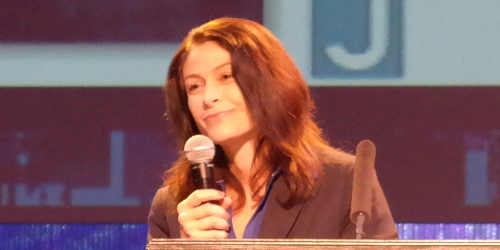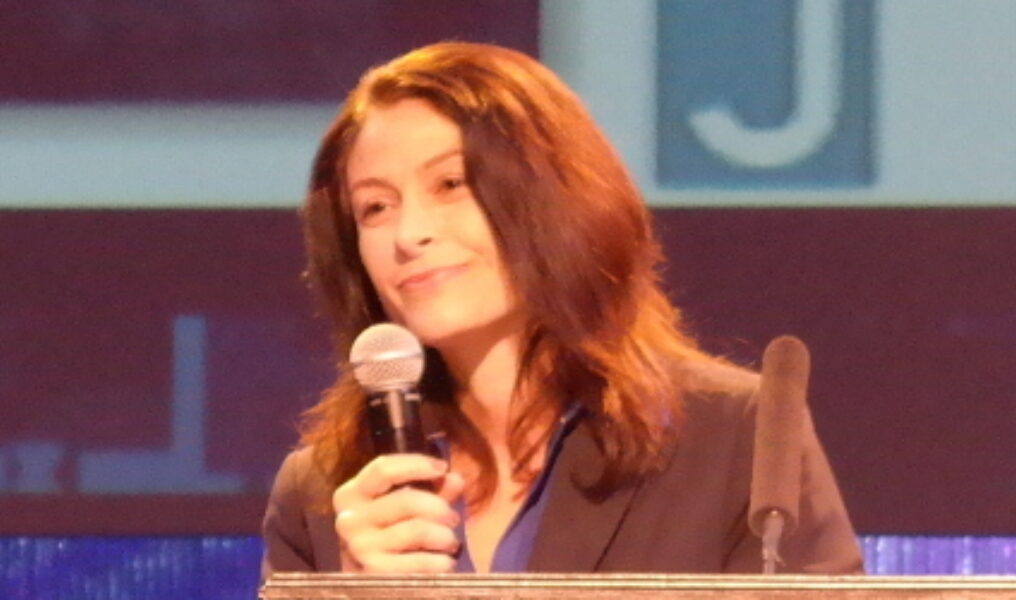
Dana Nessel
Two weeks ago Dana Nessel, the attorney who first brought the DeBoer case — one of four marriage cases decided by the Supreme Court in June which led to full marriage equality in the United States — announced that she was driving an initiative to place on the 2016 presidential ballot a question to expand employment protections for the LGBT community.
Nessel has argued that the time for waiting to push for such protections is long past.
Last year, following the November election, a lame duck Legislature tried to push a bill that would have amended Michigan laws to protect citizens from discrimination based on sexual orientation only. The transgender community was left out of the legislation, because the GOP felt they had protections already. As a result, the LGBT and ally community rallied to kill that legislation — which incidentally was backed and being promoted at the time by Jim Murray, the president of AT&T Michigan, and in direct opposition to the company's own statements that it would only support a fully inclusive law.
This has been an ongoing legislative fight since former Holland Republican lawmaker Jim Dressel introduced an amendment to Michigan's civil rights law — The Elliott-Larsen Civil Rights Act, or ELCRA — in 1981. Dressel's reward for that move was to be promptly thrown out of office the following election. And as recently as last year, a Republican lawmaker — Frank Foster — who pushed for amending the law was also ejected by Republican voters in his northern Michigan district. He was replaced by an anti-gay evangelical Christian lawmaker.
Michigan history — indeed U.S. history — shows that the LGBTQ community has never proactively taken the question of civil rights for the community to a ballot. The community has always worked legislatively, then been forced to defend laws that have been passed. The results from such initiatives have been mixed — in the U.S. and locally.
Earlier this month Houston, Texas voters overwhelmingly rejected a local ordinance, dubbed the bathroom law by opponents. The issue? Fears, stoked by right-wing religious leaders, that the law would allow men to go into women's bathrooms and harass or harm women and children.
That's not a new tactic.
Michigan has seen similar hysteria related to local nondiscrimination laws. In Hamtramck, ordinance opponents distributed campaign literature with a cartoon character clearly of a "man in a dress." In Kalamazoo, opponents distributed hanging political literature with images of Dr. Julie Nemecek — a transgender woman who sued Spring Arbor University when that organization fired her for being transgender.
The ordinance lost in Hamtramck, but won in Kalamazoo — a sample that could indicate a ballot battle is not a slam-dunk when put before the voters
But Nessel claims polling indicates the bathroom argument does not significantly move voters in Michigan.
Richard Czuba, president of Chicago based Glengariff Group, a marketing and strategic analysis outfit that handles many polls in Michigan, said he has been polling on LGBT issues with Michigan voters for nearly a decade. He told Between The Lines that support for protecting the LGBT community from discrimination is in the 70 percent area.
"We tested the bathroom message, and it had no real impact on the numbers," Czuba said.
So why did it work so well in Houston?
"They waited too long to respond," he said. According to his polling, he said, Michigan voters won't be duped by such messaging, because when they are reminded that the move is about job discrimination, voters invariably remain supportive of such a move.
Other polling and polling experts challenge that assumption.
"Rationality goes right out the window when you bring in a threat to the safety of women and children," one veteran of battles for local ordinances in Michigan told BTL in background interviews.
Houston shows that when the campaign to challenge the local ordinance arose, supporters had a 70 percent majority as well. But the measure ended up losing 61 percent to 39 percent. That was after supporters spent over $3 million to defend the law.
Cost estimates for a ballot initiative in Michigan range anywhere from $18 to 25 million or more. One person familiar with ballot initiatives in Michigan told BTL that getting the initiative on the ballot was the "cheap" part of the proposal. A million dollars can easily get an initiative for the signatures to put the measure on the ballot. The real cost comes in countering opponents and defending the measure in the court of public opinion. That requires television and other media buys, and huge rallying of human capital to knock on doors and tell the LGBT story.
While all of this is playing out in the background, Nessel has been ignoring groups urging caution. On Monday she told Tim Skubick, capitol reporter for MLive.com, "We are full steam ahead. I won't talk to anybody about stopping."
And so far she has gathered quite a team of supporters among Lansing's political elite: Czuba, GOP financer Richard McLellan, and politically connected PR guru Kelly Rossman McKinney.
McLellan did not respond to inquiries for comment. But Rossman McKinney, who is a key partner in the establishment PR firm Truscott Rossman (the other partner is former Engler communications direction John Truscott), did talk to BTL.
She reflected much of the same talking points already issued by Nessel and her supporters — particularly as it relates to polling — but when she was asked what the campaign was prepared to do in relation to the uptick in anti-LGBT violence that is usually associated with high profile political battles over LGBT rights, she was genuinely surprised that was a reality.
"No one on the team has brought that up or discussed it," she said by phone last week. "But you can rest assured I will be having that conversation right away."
Nessel is promising to file paperwork for the initiative with the Secretary of State in the "next week or two," but is pushing up against a serious deadline. Depending on whether she wants to amend the state constitution or the state law, she would have to file all the signatures by July 11 or June 1, respectively.
To amend the constitution, Nessel and her team would have to gather valid signatures (meaning registered and qualified voters) from 315,654 Michiganders. To change the law, her team would need to collect 252,523 valid signatures.










